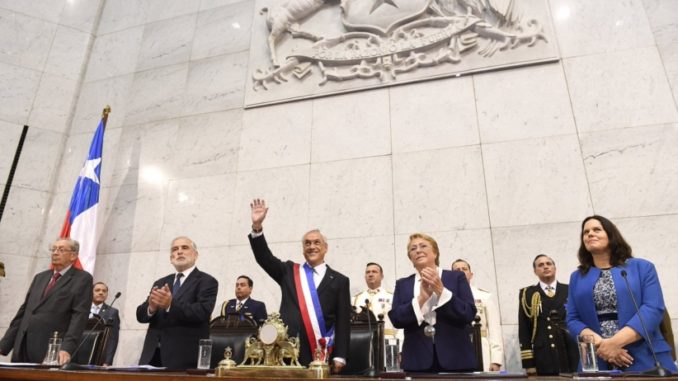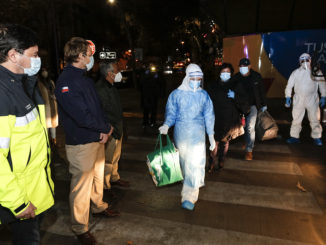
VALPARAISO – Conservative billionaire Sebastián Piñera took oath as Chile’s president on Sunday, beginning his second term with promises to revive investments in the world’s top copper producer.
Piñera, who governed Chile in 2010-2014, accepted the presidential sash from outgoing socialist president Michelle Bachelet in a ceremony in the Pacific port city of Valparaiso. He was elected in December with a strong mandate, marking a new rightward shift in South America after conservative leaders rose to power in Peru, Brazil and Argentina.
Los necesito a todos ustedes, porque en esta misión no sobra nadie y son todos bienvenidos. Hagamos de Chile una Patria grande y noble, un país de unidad, de diálogo y de acuerdos. #ChileLoHacemosTodos pic.twitter.com/Rkv1wHBNuR
— Sebastian Piñera (@sebastianpinera) March 11, 2018
Presidents from across the region attended Sebastian Pinera’s swearing-in ceremony, including Brazil’s Michel Temer, Mexico’s Enrique Pena Nieto, Bolivia’s Evo Morales and Argentina’s Mauricio Macri.

Piñera, 68, was reelected in last November elections, promising to lower taxes and boost investment, and will serve until 2022.
According to Forbes magazine, Pinera is the fourth wealthiest man in Chile, with an estimated fortune of 2.8 billion U.S. dollars.
[EN VIVO] Llegando al Palacio de La Moneda junto a los nuevos ministros. #ChileLoHacemosTodos https://t.co/b99bHDEaDm
— Sebastian Piñera (@sebastianpinera) March 11, 2018
The 68-year old president and his wife waved at supporters as they passed through streets packed with cheering Chileans waving the national flag.
“The good times are coming,” his supporters chanted after he was sworn in.
Bachelet was cheered by supporters as she capped a second term in office in which she saw through an ambitious package of reforms aimed at eliminating the institutional legacy of the 1973-1990 dictatorship of Augusto Pinochet.
In a Facebook message, she said she was “profoundly proud of the transformation that we pushed these years” and said she was convinced Chile today is more “just, equitable and free.”
She was Latin America’s last sitting chief of state who is a woman.
New cabinet
In January, Piñera announced the members of his cabinet, which has been criticized by some parties for having a marked economic aspect.
His cabinet will be composed of seven women ministers, including Cecilia Pérez, in charge of the Secretary General of Government, and 16 ministers, among them men of extreme confidence in key positions. Six members of his new cabinet had already been ministers in his first cabinet. Five are from the National Renewal Party (RN), which represents sectors of the traditional Chilean right.
Sebastián Piñera unveils his team of undersecretaries (VIDEO)
One of Piñera’s old acquaintances is the renowned economist Felipe Larraín, appointed to once again occupy the Ministry of Finance.
Rise of Piñera
Born in Santiago in 1949 into a middle-class family, Sebastián was the third of five children of Magdalena Echenique and José Piñera, an engineer and diplomat who participated in the founding of Christian Democracy.
Piñera has a degree in Commercial Engineering from the Universidad Católica de Chile and a Masters and PhD in Economics from Harvard University, where he also served as an assistant professor. He also taught at Chilean universities.
He was a consultant with the Inter-American Development Bank (IDB), the World Bank, and worked for the Economic Commission for Latin America and the Caribbean (ECLAC).
In the 1970s Piñera founded his first company, the Toltén construction company, which was later sold for $ 2 million, according to the newspaper El Mercurio. In 1978 the businessman managed to represent Chile in Visa and Mastercard credit cards and then created Bancard.
He was the general manager of banks Talca and Citicorp-Chile, Apple’s Chilean president and shareholder of some companies, among them Lan Chile (now Latam, after the merger with the Brazilian TAM). In 2004, he bought TV Chilevisión and was the largest shareholder of the parent company of the Colo-Colo football team.
Piñera joined the political career in 1990, when he was elected senator and, after being elected with an independent candidacy, joined the National Renovation party. In 1993, the party considered him to launch as presidential candidate, which did not happen because of the scandal known as “Piñeragate”. In it, Piñera was caught in wiretaps asking him to be privileged in a debate.

He was presidential candidate in 2005, after presiding the party between 2001 and 2004, but lost in the second round to Michelle Bachelet with 46.5% of the votes. In 2009 he was again presidential candidate, being elected the following year with 51.61% of the votes against former president Eduardo Frei.
Mr. Piñera was the first right-wing leader elected since democracy was restored in Chile in 1990, after a 17-year military dictatorship led by Gen. Augusto Pinochet.



